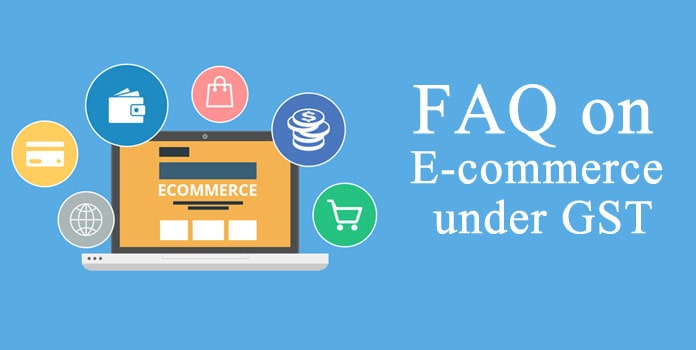In last couple of years, e-commerce has become the latest business trend not only across the world but also in India. Ecommerce platform helps sell all kinds of products and services digitally. That’s the reason the numbers in suppliers is increasing and so are GST FAQs in relation with GST application on selling of different goods and services across e-commerce websites.
In this post we have come up with GST Frequently Asked Questions which bother e-commerce suppliers. Read these latest FAQs on GST which provide clarity to an e commerce operator under GST. Read these GST FAQ 2019 to clear all your doubts.
Question 1. Who is an e-commerce operator?
Answer. A person who owns, manages or operates any digital or electronic platform in order to sell the products and services online will be termed as e-commerce operator. Some popular examples of e-commerce operators are Flipkart, Amazon, Myntra etc.
Question 2: GST Registration for e-commerce operators- is it mandatory or not?
Answer. GST registration is mandatory for every e-commerce operator irrespective of the turnover. This means that every e-commerce operator has to be GST registered no matter what is their supply because at present, there are no threshold exemptions available to them.
Question 3: Will a person who is supplying products or services over an e-commerce platform be entitled for threshold exemption?
Answer. NO. Irrespective of the supply value made by an ecommerce operator, he will not be entitled for any kind of threshold exemption. This means that all the e-commerce operators, whether big or small, will have to be registered under GST irrespective of the turnovers they have.
Question 4: Instead of supplier, will the liability of paying tax in relation with supply of goods or services made by ecommerce operator will lie on him?
Answer. YES. But ecommerce operator will be liable to pay tax only in cases which involve application of reverse charge mechanism. Under such cases, the liability of paying tax is on ecommerce operator if products or services are supplied through his ecommerce platform and all the provisions mentioned in the Act also apply to him because he is the supplier of the services and therefore, he is liable to pay the related tax.
Question 5: Return of goods is a very common practice with ecommerce customers. In such scenario, how are adjustments to return goods are made?
Answer. Tax is collected on the net value of taxable supplies that have been made. This means that the tax is calculated on aggregated supplies which are derived after deducting returns from supplies.
Question 6: What do we mean by Net Value of Taxable Supplies?
Answer. Net Value of Taxable Supplies is the aggregate value of supplies made during a month by the ecommerce operator.
Net Value of Taxable Supplies = Aggregate Value of Taxable Supplies of Goods/ Services for a month – Aggregate Value of Taxable Supplies Returned During a month.
Question 7: On behalf of actual supplier, is each e-commerce operator is suppose to collect tax?
Answer. YES. Each and every e-commerce operator has to make tax collections on behalf of the actual supplier.
Question 8. When are these tax collection required to be made by an e-commerce operator?
Answer. When a reasonable amount is collected from recipient, tax collection has to be made during a month.
Question 9. What is TCS or Tax Collection Source?
Answer. TCS is defined as the tax amount collected by e-commerce operator at one percent rate of net value of taxable supplies that have been made through the platform.
Question 10. What is the duration of time in which TCS is suppose to be remitted to Government by e-commerce operator?
Answer. After the end of the month during which the amount was collected, within a duration of 10 days it has to be remitted.

